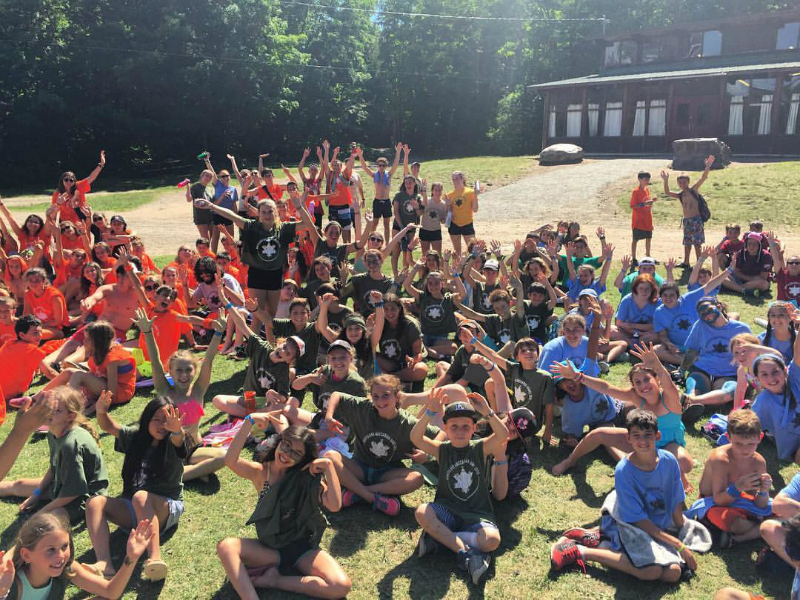Simon Wolle is already up at Camp Northland—B’nai Brith in Haliburton, Ont., checking that the property is ready for the anticipated opening of camp next month.
“Camp is absolutely ready,” he said. “The only thing missing are our kids and our staff.”
There are still a few hurdles to overcome, said Wolle, the camp’s director, but he’s optimistic that as Ontario’s vaccination rates rise, the province will progress into Stage 2 and that camps will open, about a week later than planned.
It was a different story last summer, when COVID precautions shuttered overnight camps across the country. Camps scrambled to fill the void, moving as many programs from sing-alongs to scavenger hunts, online.
This year, it’s more of a patchwork, with some provinces opening up quicker than others, which means camps in Ontario and Quebec are operational. In other provinces, some camps waiting for approval ran out of time needed to prepare and will remain closed again for an unprecedented second summer.
In Alberta, Camp BB Riback’s director Stacy Shaikin was on a conference call with provincial health officials just a few days ago, when, suddenly, overnight camps were moved up a stage and told they could re-open in June.
Camp BB Riback, located midway between Calgary and Edmonton, had already decided to cancel the traditional camp it runs for 260 campers and move to a family camp model, renting out cabins and running programs for families.
Now it will also offer a four-week leadership training program for 70 kids in grades 7 to 11.
For Shaikin, the news is bittersweet. He’s disappointed that younger kids will lose out on a second summer of camp, but the decision also meant he could offer some campers a month of summer fun, and pay the staff already working up at camp.
“It’s such a relief,” Shaikin said. “I’ve got some staff here helping me getting some stuff ready… but I could only pay for them a couple of months and I couldn’t promise them there would be revenue afterwards. Now that I know we can run something, there’s money for them to get their salaries, which they deserve and more than earned.”
Some camps won’t be able to open at all. With strict restrictions on visitors from out of province, Camp Kadimah, a Canadian Young Judaea camp in Nova Scotia, announced it won’t operate this year.
The camp had investigated renting a site in Quebec, where camps have been given the green light, but ultimately, it concluded that wasn’t possible.
“The change of location, the change in dates, additional costs and the uncertainty of the environment pointed to an alternative camp not being feasible,” said a notice on the camp’s website. “This was a very painful, heart-wrenching but necessary decision at this time.”
Canadian Young Judaea, which runs camps across Canada, did not respond to phone calls for a comment.
“Everyone was really disappointed. We’re a huge Kadimah family,” said Kelly Wood, whose three children have attended the camp.
“Summer camp is incredibly important for the children and the parents,” she said. “We want our kids to go to a Jewish camp.”
Instead, two of her children will go to Camp B’nai Brith of Ottawa, where the director was “incredibly accommodating,” knowing that campers were registering while still waiting to hear about Kadimah’s plans, Wood said.
Wood’s teenage daughter, who was supposed to have been a counsellor-in-training this summer at Kadimah, has been the most disappointed that the camp won’t open. She’s on the waiting list to attend another Young Judaea camp. “Hopefully she’s able to be a kid for one more summer,” Wood said.
Even for the camps that manage to open, it won’t be business as usual.
Northland’s campers will have to quarantine before camp, be driven up by their family instead of riding the camp bus, and take a COVID test before entering. There will be more meals eaten outside and the camp has invested in expanding its open-air facilities. To preserve the camp bubble, there are no trips off the property or visitors day.
Running a COVID-compliant camp adds significant expenses and many camps have added an extra fee to cover the costs. At Northland, it’s $250 per camper. It would have been higher, said Wolle, but the community’s generosity has helped keep prices down.
An online fundraising drive held last month for 16 day and overnight Jewish camps in Ontario raised $1.1 million. Many camps, including Northland, exceeded their fundraising goals.
Campers are eager to return, even though camp may look different, Wolle said. Nearly every age group is full, some have waiting lists, and he is looking to hire more staff.
Many camps report that they had fewer staff members return this year, especially with the uncertainty about whether camp would open.
At Northland, a donor has stepped in and Wolle is paying up to $1,000 in a completion bonus for staff this summer—an offer that’s already generating interest, he said.
Despite the challenges, Wolle said he is ready to re-open camp. “We’re going to have an incredible summer. It’s going to be different and different doesn’t mean worse. I think the experience will be something new for all of us.”
Running a camp has always meant that staff have to be flexible and adaptable, he said.
“Camp staff are experts at rainy-day programming and in a way, this is our biggest rainy-day program ever. We’re going to make sure it has all the incredible creativity and dynamic energy of all of our good programs.”
RELATED STORY: Quebec Jewish sleepaway camps are reopening this summer
